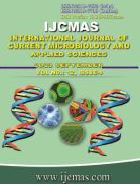


 National Academy of Agricultural Sciences (NAAS)
National Academy of Agricultural Sciences (NAAS)

|
PRINT ISSN : 2319-7692
Online ISSN : 2319-7706 Issues : 12 per year Publisher : Excellent Publishers Email : editorijcmas@gmail.com / submit@ijcmas.com Editor-in-chief: Dr.M.Prakash Index Copernicus ICV 2018: 95.39 NAAS RATING 2020: 5.38 |
Ladybird beetles (Coleoptera: Coccinellidae) are a variety of creatures that can be found in a wide range of terrestrial ecosystems. They are members of the Coleoptera order, Polyphaga suborder, Cucujoidea superfamily, and Coccinellidae family. The majority of the coccinellids are predatory in nature and feeds on a variety of pests like aphids, thrips, small larvae, mites, fungus, etc., and thus have huge potential for managing a wide range of pests of economically significant crops. Both the adult and larval stages are predacious in nature and feed on different kinds of pests. Since they are the natural answer to pest control and are far more efficient than hazardous chemicals, their existence in agroecosystems aids in lowering the use of dangerous chemical pesticides. Coccinellids are multivoltine i.e., producing many generations in a year. The life cycle of coccinellids has four developmental stages: eggs, larva, pupa, and adult. By utilizing various tactics, the efficacy of coccinellids as biological control agents can be increased. Such as spraying nutrients like sucrose on crops to enhance the reproductive rate of coccinellids. Numerous insect and fungal pests disrupt ecosystems in horticulture and agriculture around the world; these pests are naturally managed by biocontrol agents. In the present review the role of coccinellids as biological control agents of insects and fungal pests has been analyzed.
 |
 |
 |
 |
 |